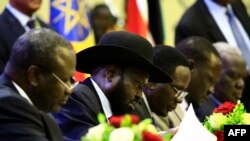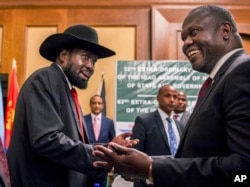South Sudan leaders agreed to end hostilities Sunday in the latest attempt to end the country’s five-year civil war, which has killed tens of thousands of people. Some analysts say the deal will succeed only if the country's political leaders can finally find a way to work together.
South Sudanese leaders have once again agreed to end the war and work towards peace. East African head of states gathered Sunday in Khartoum to witness the signing of a new peace deal between the government of President Salva Kiir, rebel leader Riek Machar and other opposition groups.
The sides all agreed to end hostilities and to work together in a transitional government scheduled to last for three years.
Speaking in Khartoum Sunday, Kenya’s President Uhuru Kenyatta congratulated the political leaders of South Sudan.
“I commend all of you for concluding the discussion on the critical issue of security and governance," said Kenyatta. "These two are critical for peace and stability in South Sudan. We stand with you because today history beacons you to seize the opportunity offered here in Khartoum to marshal your commitment and drive and claim the future of South Sudan as one people.”
The agreement returns Riek Machar from exile to the post of first vice president, and four more vice presidents will also be appointed. The document signed by the leaders says the president will collaborate, but will have duties and powers in accordance with a 2015 peace deal.
The 2015 agreement allows the president to consult with people like Machar, but final decisions rest with Kiir.
Kwaje Lasu is a spokesman for the South Sudan Opposition Alliance, which consists of nine parties. His group also signed the peace deal. He says good governance can save the deal.
“It's not even that long as an independent nation, but we have been through a lot, and our people have suffered. But because of those pillars that are holding the building is very weak, what I mean by that institutional reforms, justice, and accountability, the rule of law, giving the people what they deserve in terms of governance all this component of the government determine the viability of this agreement,” said Lasu.
Political observers in the region have questioned the will of Kiir and Machar to work together in peace.
The 2015 peace deal collapsed just a year later when a flare-up of violence in Juba left hundreds dead and prompted Machar to flee the country.
Commentator Fulbert Namwamba says without adequate security it will be difficult for Machar to work.
“Machar would like to work with Kiir, but the problem is that the circumstances under which he left Juba is such that there have to be a guarantee that he can bring his army to Juba and then he has to be within his barrack, otherwise he becomes a sitting duck in a country that is unpredictable,” said Namwamba.
The civil war has uprooted more than 4 million South Sudanese civilians from their homes.





